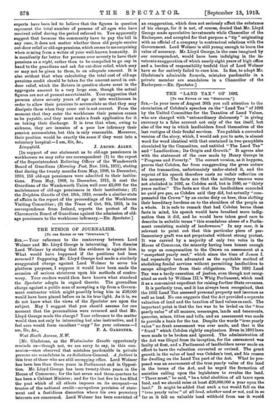THE ETHICS OF JOURNALISM. [To TER EDITOR OF TRY "SPICTATOR."]
SIR,— Your reference to the controversy between Lord Wolmer and Mr. Lloyd George is interesting. You dismiss Lord Wolmer by stating that the evidence is against him. What would have happened if the positions had been reversed ? Supposing Mr. Lloyd George had made a similarly exaggerated charge against Lord Wolmer to serve his platform purposes, .I suppose it would have been made the occasion of serious strictures upon his methods of contro- versy. Your readers would then have known what standard the Spectator adopts in regard thereto. The groundless charge against a public man of accepting a tip from a Govern- ment contractor which might possibly bring him in £30,000 would have been placed before us in its true light. As it is, we do not know what the views of the Spectator are upon the subject. May I suggest that you should assume for one moment that the personalities were reversed and that Mr. Lloyd George made the charge? Your reference to the matter would then not only be interesting but also instructive, and I feel sure would form excellent " copy " for your columns.—I am, Sir, &c., F. A. GA.RDINER. West Heath Avenue, N. W.
[Mr. Gladstone, as the Westminster Gazette opportunely reminds us—though not, we are sorry to say, in this con- nexion—once observed that mistakes pardonable in private persons are scandalous in ex-Solicitors-General. A fortiori is this true of those who are still occupying office. Lord Wolmer has been less than three years in Parliament and in Opposi- tion. Mr. Lloyd George has been twenty-three years in the House of Commons; for the last seven and three-quarters he has been a Cabinet Minister; and for the last five he has filled the post which of all others imposes on its occupant—as trustee of the national credit—scrupulous precision of state- ment and a fastidious discretion where his own pecuniary interests are concerned. Lord Wolmer has been convicted of an exaggeration, which does not seriously affect the substance of his charge, for it is not, of course, denied that Mr. Lloyd George made speculative investments while Chancellor of the Exchequer, and accepted for that purpose a "tip" originating with an official cf a company in contractual relations with the Government. Lord Wolmer is still young enough to learn the value of accuracy. Mr. Lloyd George, in the case imagined by our correspondent, would have been indulging in the in- veterate exaggeration of which nearly eight years of high office and a burden of responsibility tenfold that of Lord Wolmer have so far entirely failed to cure him. In fine, to adapt Mr. Gladstone's admirable formula, mistakes pardonable in a private member are scandalous in a Chancellor of the Exchequer.—En. Spectator.]










































 Previous page
Previous page